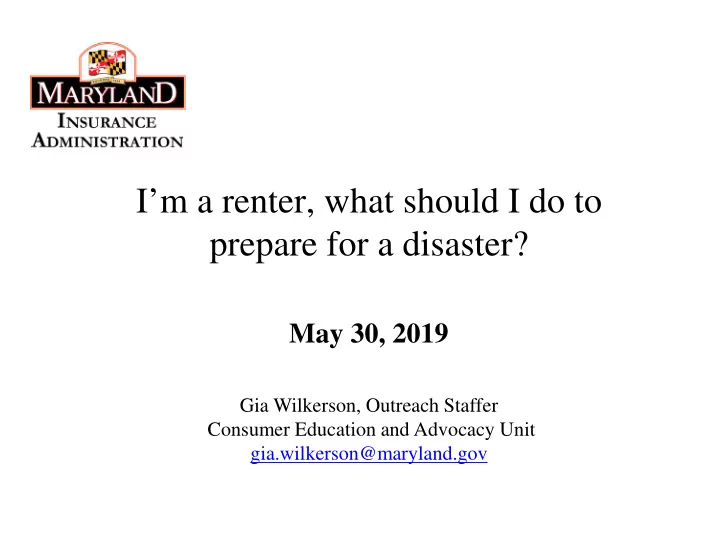

I’m a renter, what should I do to prepare for a disaster? May 30, 2019 Gia Wilkerson, Outreach Staffer Consumer Education and Advocacy Unit gia.wilkerson@maryland.gov
This presentation does not provide legal advice. You should discuss specific questions with your trusted financial advisor or insurance producer. 2
Agenda • What is the Maryland Insurance Administration? • Do You Need to Prepare? • What is Renters Insurance? • What Does a Renters Insurance Policy Cover? • What Does a Renters Insurance Policy Typically Cover? • Insurance Preparedness Tips: Know What is Not Covered • Flood Insurance • After a Loss • Be Prepared 3
What is the Maryland Insurance Administration (MIA)? • The MIA is the state agency that regulates Maryland’s insurance market. • The agency's goal is to provide efficient, effective service to both the consumers of insurance products and the insurance industry. • The MIA assures fair treatment of consumers by regulating the availability of insurance coverage at fair prices and extends to issues of solvency and fair sales, claims and settlement practices. • The agency strives to increase public understanding of the vital role insurance plays in the daily lives of Maryland residents and businesses. 4
Do You Need to Prepare? • Natural disasters can happen any time and any place; Maryland is no exception. • In the last few years, Marylanders have sustained a significant amount of damage to their homes, apartments, businesses and personal property as a result of tornadoes, floods and severe winds. • While natural disasters are out of our control, you can take steps to lessen the exposure to these types of losses and ensure that you have the appropriate insurance to cover potential damages. 5
What is Renters Insurance? Renters insurance is an insurance policy that protects you against loss or damage of your personal property, whether you rent an apartment, house or a room in a house. It may also protect you against liability if someone else suffers injury or property damage while in your apartment, house, or room. 6
What Does A Renters Insurance Policy Cover? • If you rent, your personal belongings will not be protected against loss or damage unless you have a renters insurance policy. • Your landlord may have insurance for structural damage to the building, and might even be protected against damage caused by tenants. • However, this coverage does not extend to your personal property, nor does it protect you from being liable for damage you might cause to the building inadvertently (e.g., a kitchen fire or a plumbing mishap) or to others who are injured at your property (e.g., a trip and fall over toys or furniture). 7
What Does A Renters Insurance Policy Typically Cover? This type of policy: – covers loss or damage to household contents or personal possessions; – provides for additional living expenses in the event a covered loss makes your home, apartment or condominium uninhabitable; – provides you with liability coverage for injuries to others and/or their property while they are on your property; and – includes medical payments to others. Many policies will insure your belongings even if they are damaged while not in your rented home or apartment. – For example, items you have insured often are covered if they are stolen by someone who breaks into your car or if they are damaged while not on your property. 8
Insurance Preparedness Tips: Know What is Not Covered Most renters policies will not pay to repair or replace belongings damaged as a result of the following: – Mudslide – Earth movement – Groundwater or seepage – Flood 9
Flood Insurance • Flood insurance is a separate policy from your renters policy. • Renters can purchase flood insurance for their personal property. • Your landlord may purchase a separate policy for the structure but this policy will not cover your personal property. • Ask your insurance agent or company if your policy fully protects you or whether you need to purchase additional coverage. • For more information, go to www.floodsmart.gov. 10
After A Loss • Contact your insurance company promptly after sustaining a loss. • Take photographs and/or video of the property clearly showing the damages. • Before you remove any damaged property from the premises, be sure an insurance adjuster or your agent has seen the damage. 11
After A Loss • As soon as possible, prepare a detailed inventory of all damaged or destroyed property. Give a copy to the insurance adjuster and keep a copy for yourself. It should include: – Description and quantity of items. – Date of purchase or approximate age. – Cost: time of purchase and estimate to replace. • Keep all receipts for emergency repairs. • Be present when the insurance adjuster inspects your property. • Do not accept an inadequate settlement offer. Cashing a check may bar you from seeking additional compensation; confirm in writing that it will not. 12
Be Prepared • Create an inventory of all your possessions and keep it updated. • Photograph and/or video each room. • Safeguard your records: insurance policies, inventory list. • Keep handy your insurance agent’s name, telephone number, and your policy number(s). 13
Reminder If your insurance company denies any part of your claim, be sure they put the denial in writing and you keep all the paperwork. 14
Keep In Mind • We’re here to assist with all of your insurance questions or issues. • Contact us to verify the agent/company you select is authorized to sell insurance in Maryland to protect yourself from fraud. • Maryland Insurance Administration www.insurance.maryland.gov 800-492-6116 15
Contacts Al Redmer, Jr., Maryland Insurance Commissioner Office: 410-468-2090 Maryland Insurance Administration 1-800-492-6116 www.insurance.maryland.gov National Flood Insurance Program 1-800-427-4661 www.floodsmart.gov 16
Contacts Maryland Emergency Management Agency 1-877-636-2872 www.mema.maryland.gov Federal Emergency Management Agency 1-202-646-2500 www.fema.gov 17
Questions? 18
Recommend
More recommend